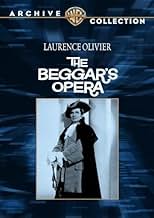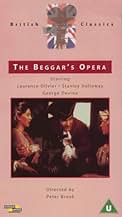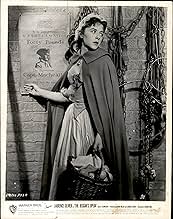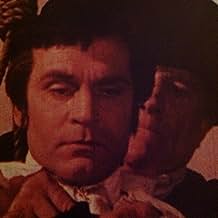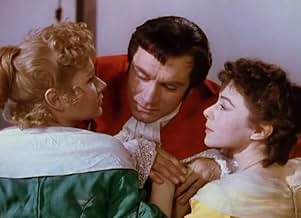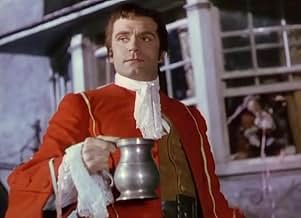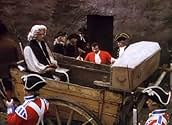अपनी भाषा में प्लॉट जोड़ेंWhen the composer of an opera about a swashbuckling, wenching highwayman meets his hero's real-life counterpart, he's disappointed with his lack of dash.When the composer of an opera about a swashbuckling, wenching highwayman meets his hero's real-life counterpart, he's disappointed with his lack of dash.When the composer of an opera about a swashbuckling, wenching highwayman meets his hero's real-life counterpart, he's disappointed with his lack of dash.
- निर्देशक
- लेखक
- स्टार
फ़ीचर्ड समीक्षाएं
The Beggar's Opera has so much going for it. The author, John Gay placed it squarely in an underworld of thieves, whores, liars, drunkards, double-crossers, and corrupt officials. He gave them a witty voice, where moral values are reversed, and most importantly he gave them newly worded songs set to recent popular tunes.
The Beggar's Opera continues to be an important work, that has been raided by later writers; most importantly by Brecht who adapted its main elements as The Threepenny Opera; and also by writers such as Dennis Potter (Pennies From Heaven clearly borrows heavily from from The Beggar's Opera, down to the final twist).
This is a film that should work well as a film-of-the-stage, for there is always a sense that the characters are trapped in their little world, in each other's pocket, and all knowing each other's business. But Peter Brook tries to make the film more cinematic by opening the action out in places. Though this is understandable, it entails some unfortunate compromises. The attempt to inject some new life into this film, with primarily visual scenes and a bit of derring-do action, means that Brook is forced to cut the text severely in places, and the strength of the piece lies in the words Gay wrote, not in the pictures that Brook creates. The film works well where the original text survives and the characters are allowed to speak, but that happens rarely. And Brook also messes about with the twist-ending!
In brief, enough survives of the original to make it worth watching, if there's no better alternative.
The Beggar's Opera continues to be an important work, that has been raided by later writers; most importantly by Brecht who adapted its main elements as The Threepenny Opera; and also by writers such as Dennis Potter (Pennies From Heaven clearly borrows heavily from from The Beggar's Opera, down to the final twist).
This is a film that should work well as a film-of-the-stage, for there is always a sense that the characters are trapped in their little world, in each other's pocket, and all knowing each other's business. But Peter Brook tries to make the film more cinematic by opening the action out in places. Though this is understandable, it entails some unfortunate compromises. The attempt to inject some new life into this film, with primarily visual scenes and a bit of derring-do action, means that Brook is forced to cut the text severely in places, and the strength of the piece lies in the words Gay wrote, not in the pictures that Brook creates. The film works well where the original text survives and the characters are allowed to speak, but that happens rarely. And Brook also messes about with the twist-ending!
In brief, enough survives of the original to make it worth watching, if there's no better alternative.
This was a very enjoyable movie especially if you like period pieces and/or musicals. Hearing Laurence Olivier sing is reason enough to watch this. The cinematography is outstanding and the movie as a whole is very colorful.
Obviously, the song "Mack the Knife" made famous by Bobby Darin, Louis Armstrong and Frank Sinatra is based on this opera/movie. MacHeath is in the opera/movie as is Jenny Diver and Sukey Tawdrey. Louie Miller, Lotte Lenya and Lucy Brown are mentioned in the song (and not in the opera/movie) but, after all, MacHeath was a notorious highwayman and ladies' man.
Obviously, the song "Mack the Knife" made famous by Bobby Darin, Louis Armstrong and Frank Sinatra is based on this opera/movie. MacHeath is in the opera/movie as is Jenny Diver and Sukey Tawdrey. Louie Miller, Lotte Lenya and Lucy Brown are mentioned in the song (and not in the opera/movie) but, after all, MacHeath was a notorious highwayman and ladies' man.
While this is an adequate rendering of the famous John Gay mock opera, it suffers from having Olivier sing the entire role in his own untrained voice. After a while his vocalism grows wearisome, having a slight flat and dull quality to his tone.
Brook's direction is also lacking; in trying to open the action up on screen, it looks somewhat forced and off balance. This is still a good film, all things considered and the fact that it's a rare filming of this work.
So in the end we give it a grade of B, and hope a better version will subsequently be made.
Brook's direction is also lacking; in trying to open the action up on screen, it looks somewhat forced and off balance. This is still a good film, all things considered and the fact that it's a rare filming of this work.
So in the end we give it a grade of B, and hope a better version will subsequently be made.
Sir Laurence Olivier expressed a great deal of disappointment with the way The Beggar's Opera finally turned out. On reflection he probably would have done it as a straight dramatic play. Certainly the role of the swaggering outlaw Captain Macheath would seem to be a choice part.
Olivier had sung before on screen, in Fire Over England he warbled an old English ditty There Was a Spanish Lady Who Wooed an English Man and did very well by it in his portrayal of Michael Ingolby in that film. But the problem is that in Fire Over England he was the only one singing. Later on he did very well in The Entertainer as song and dance man Archie Rice. But in The Beggar's Opera his voice suffers by comparison to the trained voices that were dubbed for all the other players except Olivier and Stanley Holloway.
I guess producer Herbert Wilcox felt he couldn't dub voices as known as Olivier and Holloway. But Holloway was a musical performer so he didn't suffer by comparison.
The Beggar's Opera has been argued to be the first musical play done in the English language. John Gay wrote the book and lyrics and the music is taken from old English tunes and arranged by Johann Christoph Pepusch. It's a satire of the corrupt and bawdy age of Robert Walpole, King George I's Prime Minister and the first person to be actually called by that title.
The Age of Walpole began with the end of War of Spanish Succession and the death of Queen Anne and the Hanover succession secured. Robert Walpole had some very simple ideas on what was best for the United Kingdom. Everybody make money, eat, drink and be merry, secure good trade deals and keep out of war at all costs. You could buy anything during his time, including honor and justice. Merchant Peachum played by George Devine is a caricature of Walpole. A most greedy man who'll do anything for a pound.
Macheath knows the people he's dealing and he does it on their own terms. He gets arrested for rewards, he buys a reprieve. It really did work that way back in Walpole's time.
And he's romancing two women, Polly Peachum and Lucy Lockit although the women use him as much as he uses them. Lucy's dad is Stanley Holloway the jailkeeper who's not above a bribe or two from prisoners able to pay.
The Beggar's Opera got a Teutonic remake when Kurt Weill and Berthold Brecht did The Threepenny Opera in the last century and the immortal Mack the Knife comes from it.
Still if The Beggar's Opera was to be done in its original form, wouldn't it have been far better to have a group like the D'Oyly Carte Light Opera Company who do so well with Gilbert and Sullivan do this instead of straight players who have to be dubbed?
Olivier had sung before on screen, in Fire Over England he warbled an old English ditty There Was a Spanish Lady Who Wooed an English Man and did very well by it in his portrayal of Michael Ingolby in that film. But the problem is that in Fire Over England he was the only one singing. Later on he did very well in The Entertainer as song and dance man Archie Rice. But in The Beggar's Opera his voice suffers by comparison to the trained voices that were dubbed for all the other players except Olivier and Stanley Holloway.
I guess producer Herbert Wilcox felt he couldn't dub voices as known as Olivier and Holloway. But Holloway was a musical performer so he didn't suffer by comparison.
The Beggar's Opera has been argued to be the first musical play done in the English language. John Gay wrote the book and lyrics and the music is taken from old English tunes and arranged by Johann Christoph Pepusch. It's a satire of the corrupt and bawdy age of Robert Walpole, King George I's Prime Minister and the first person to be actually called by that title.
The Age of Walpole began with the end of War of Spanish Succession and the death of Queen Anne and the Hanover succession secured. Robert Walpole had some very simple ideas on what was best for the United Kingdom. Everybody make money, eat, drink and be merry, secure good trade deals and keep out of war at all costs. You could buy anything during his time, including honor and justice. Merchant Peachum played by George Devine is a caricature of Walpole. A most greedy man who'll do anything for a pound.
Macheath knows the people he's dealing and he does it on their own terms. He gets arrested for rewards, he buys a reprieve. It really did work that way back in Walpole's time.
And he's romancing two women, Polly Peachum and Lucy Lockit although the women use him as much as he uses them. Lucy's dad is Stanley Holloway the jailkeeper who's not above a bribe or two from prisoners able to pay.
The Beggar's Opera got a Teutonic remake when Kurt Weill and Berthold Brecht did The Threepenny Opera in the last century and the immortal Mack the Knife comes from it.
Still if The Beggar's Opera was to be done in its original form, wouldn't it have been far better to have a group like the D'Oyly Carte Light Opera Company who do so well with Gilbert and Sullivan do this instead of straight players who have to be dubbed?
Multi-nominated Laurence Olivier is the rogue Captain MacHeath. Hugh Griffith is the beggar. and they are both in the the royal prison. Griffith is writing an opera about the wild adventures of such a wild man as MacHeath. and now we're in the flashback, showing what led them to their current predicament. i'm not surprised that this was a flop; it's played so straight.. it needed a hook, or bigger humor. or less singing! i know, it's an opera. still, they break into song even before the drop of a hat, and then sing about the drop and the hat. it's a lot. This was actually produced by Olivier... (my favorite Olivier film is Rebecca; its awesome. and my favorite Hugh Griffith film is Start the Revolution without Me. but he won the oscar for Ben Hur.) Directed by Peter Brook. Original opera by John Gay... lived 1685 to 1732. died young at 47 . and this story has been remade numerous times. it's a bit purient, if you read up on it, and clearly was toned down in some versions, "for decency". shows on Turner Classics now and then. not for me, but some will enjoy the music combined with story.
क्या आपको पता है
- ट्रिविया"The Beggar's Opera" is a ballad opera popular during the early eighteenth century, which used the music of popular folk songs, ballads and church hymns set to new lyrics to satirize social customs, mores, and especially Italian opera. It copied the three act Italian operatic format, rather than the then-custom of five acts.
- भाव
Captain MacHeath: [Hearing a woman singing] Women!... I love the sex!... and a man who loves money might as well be contented with one guinea... as I with one woman.
- क्रेज़ी क्रेडिटUnusually, the ghost vocalists for the non-singing actors were given billing in the end credits.
- कनेक्शनFeatured in Carry on Forever: एपिसोड #1.1 (2015)
टॉप पसंद
रेटिंग देने के लिए साइन-इन करें और वैयक्तिकृत सुझावों के लिए वॉचलिस्ट करें
विवरण
बॉक्स ऑफ़िस
- बजट
- £5,00,000(अनुमानित)
- चलने की अवधि1 घंटा 34 मिनट
- पक्ष अनुपात
- 1.37 : 1
इस पेज में योगदान दें
किसी बदलाव का सुझाव दें या अनुपलब्ध कॉन्टेंट जोड़ें


